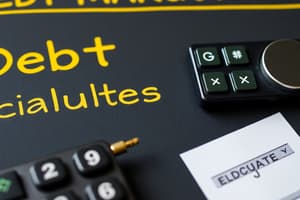Podcast
Questions and Answers
What does capacity refer to in terms of credit?
What does capacity refer to in terms of credit?
- The ability to repay a loan based on income and expenses (correct)
- The total cost of borrowing money
- The condition of having collateral for a loan
- The amount of debt a person can take on
Which term describes the interest rate for a loan expressed as a percentage over a year?
Which term describes the interest rate for a loan expressed as a percentage over a year?
- Minimum payment
- Collateral
- Loan term
- Annual percentage rate (APR) (correct)
What is the primary purpose of collateral in a loan agreement?
What is the primary purpose of collateral in a loan agreement?
- To increase the loan amount offered
- To secure the loan and reduce lender risk (correct)
- To determine the borrower's credit score
- To establish the loan term and conditions
Which type of credit typically requires monthly payments on specified due dates?
Which type of credit typically requires monthly payments on specified due dates?
What defines a grace period for a credit card?
What defines a grace period for a credit card?
Flashcards are hidden until you start studying
Study Notes
Debt
- Money owed to another person or entity.
- Can be secured or unsecured.
Finance
- The management of money, including saving, investing, and borrowing.
- Encompasses personal, corporate, and government finance.
Annual Percentage Rate (APR)
- The annual interest rate charged on a credit card or loan.
- Includes interest and any fees.
Capacity
- An individual's ability to repay debt based on their income, expenses, and debt obligations.
- A crucial factor lenders consider when assessing creditworthiness.
Capital
- An individual's assets, such as savings, investments, and property.
- Represents financial resources available for debt repayment.
Character
- An individual's credit history, demonstrating their responsible use of credit and repayment capabilities.
- Reflected in credit score and debt repayment history.
Collateral
- An asset pledged as security for a loan.
- If the borrower defaults, the lender can seize the collateral to recover their losses.
Conditions
- The terms and agreements surrounding a loan, including interest rates, repayment terms, and fees.
- Important to understand conditions before entering into a loan agreement.
Credit Card
- A plastic card that allows the holder to make purchases on credit.
- Offers convenience but requires responsible use to avoid accruing high interest charges.
Credit History
- A record of an individual's borrowing and repayment activity.
- Reflects their financial responsibility and impacts their credit score.
Credit Score
- A numerical representation of an individual's creditworthiness.
- Based on factors such as payment history, debt levels, and credit utilization.
Grace Period
- The time allowed for making a payment on a loan or credit card without incurring late fees.
- Varies depending on the lender or card issuer.
Loan Term
- The length of time over which a loan is repaid.
- Impacts the monthly payment amount and total interest paid.
Minimum Payment
- The smallest amount that must be paid on a credit card or loan each month.
- Making only the minimum payment can lead to high interest charges and prolonged debt.
Student Loans
- Loans specifically designed to help finance educational expenses.
- Types include federal and private student loans.
Auto Loan
- A loan used to finance the purchase of a car or truck.
- Typically secured by the vehicle itself as collateral.
Personal Loans
- A loan used for various purposes, such as debt consolidation, home improvement, or medical expenses.
- Often unsecured and require a higher credit score approval.
Installment Credit
- A loan repaid in equal installments over a specific period.
- Examples include auto loans, mortgages, and personal loans.
Revolving Credit
- A credit line that can be used and repaid multiple times.
- Examples include credit cards and lines of credit.
Service Credit
- Credit available to individuals who obtain services such as utilities (electricity, gas) and telecom (phone, internet).
- Can be a factor in establishing a credit history, especially for those without prior loans or credit cards.
Studying That Suits You
Use AI to generate personalized quizzes and flashcards to suit your learning preferences.




